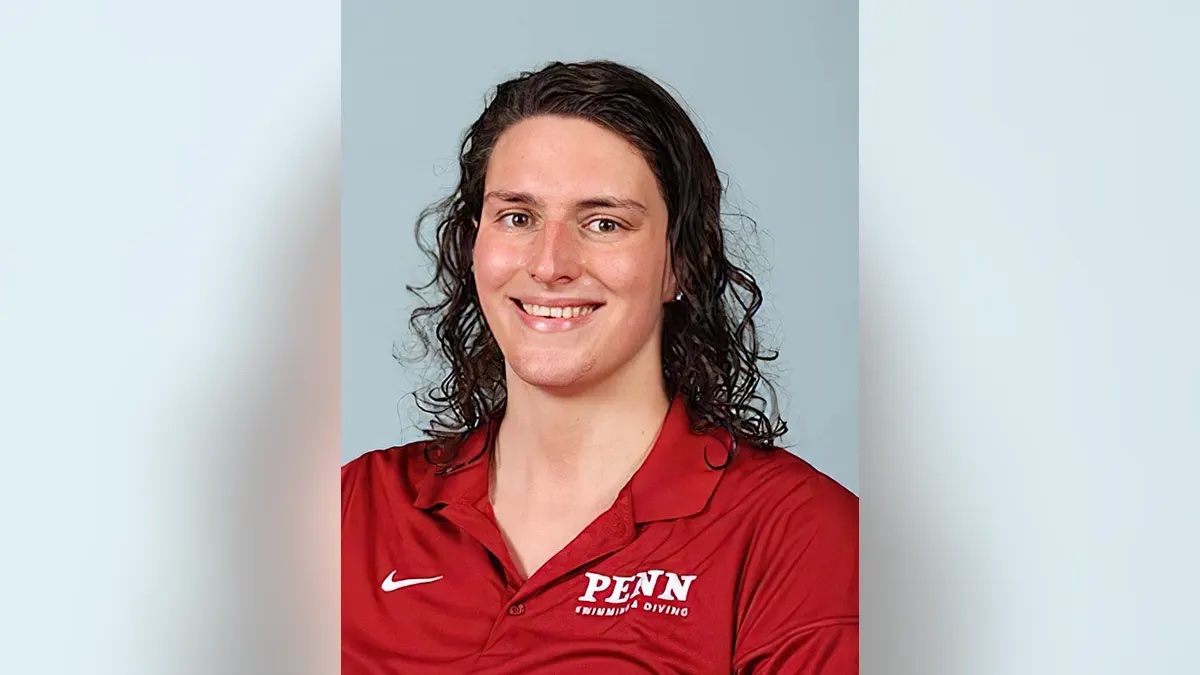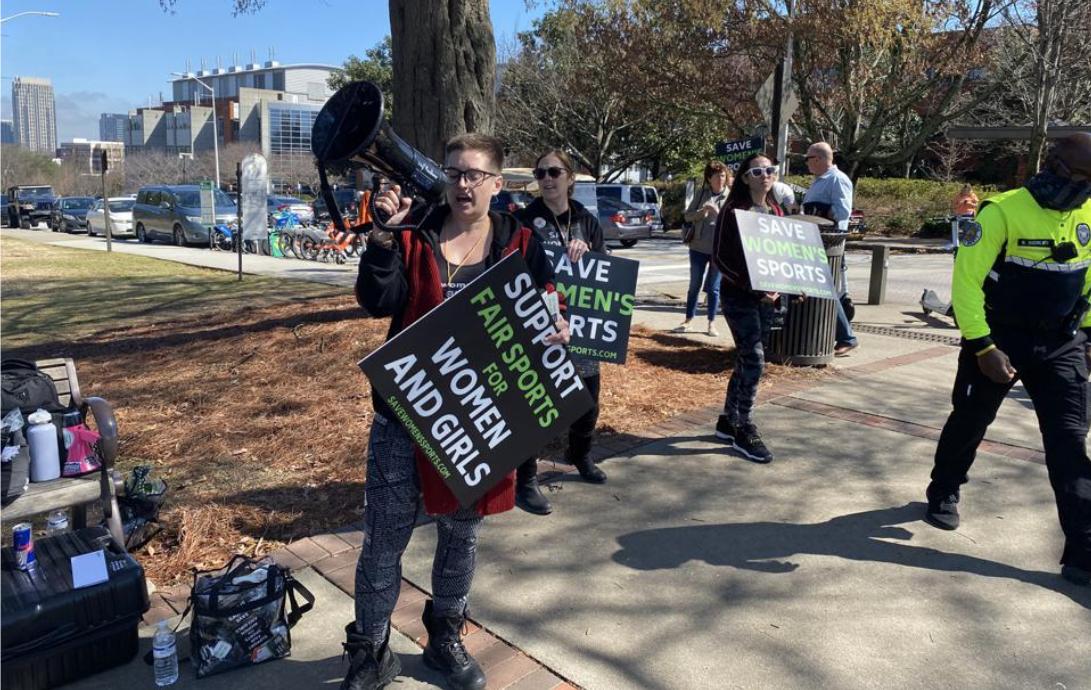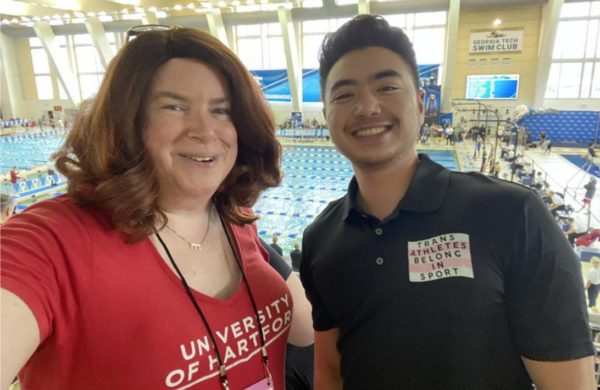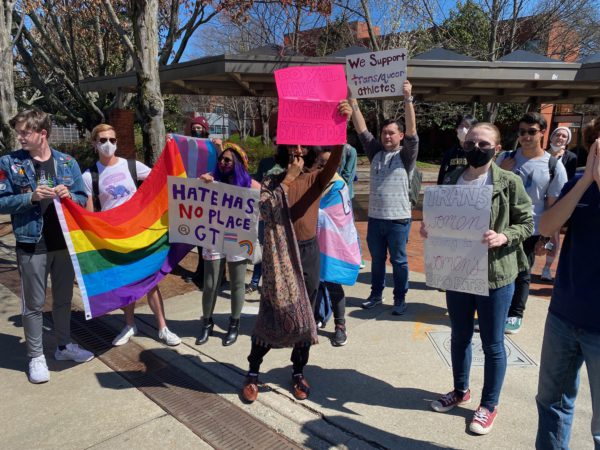Sports
Lia Thomas is NCAA’s first Transgender D-1 National Champion
Despite the change in trans participation policies by USA Swimming that would have disqualified her, NCAA ruled Thomas was qualified to swim

Lia Thomas, a senior at the University of Pennsylvania, swam faster than any other woman in the 500-yard freestyle competition Thursday in Atlanta and made history by doing so. Not just because she finished in 4:33:24, more than a second faster than her closest competitor, but because she is an out transgender woman.
Her honor came at the Women’s Swimming and Diving National Championships, and despite rules that require her to speak to the news media following her win, Thomas spoke only to ESPN and “declined” attending the mandatory news conference, according to a spokesperson.
As for her victory, there are people who are plenty mad about it. When ESPN interviewed the 22-year-old, live, following the event, and some in the crowd booed.
“I didn’t have a whole lot of expectations for this meet,” Thomas told ESPN, according to a transcript of the interview provided by out nonbinary journalist Katie Barnes. “I was just happy to be here, trying to race and compete as best as I could.”
The ESPN correspondent asked the Austin, Texas native about competing “under the spotlight.”
“I try to ignore it as much as I can. I try to focus on my swimming, what I need to do to get ready for my races and just try to block out everything else,” Thomas said. She added: ”It means the world to be here, being with two of my best friends and teammates and to be able to compete.”
The interview ended, and some in the stands booed. Among the parents and supporters from across the country were demonstrators from an anti-transgender inclusion organization, Save Women’s Sports.

“It’s not right. It’s not fair,” Beth Stelzer, the group’s founder, told me amid a crowd of about 20 anti-trans protesters, waving signs and leading chants with a bullhorn outside the McAuley Aquatics Center on the campus of Georgia Tech.
“We are here to give these girls, parents, coaches, that are too afraid to speak up a voice, because women matter. We won’t say no. Save women’s sports!”

Despite the change in transgender participation policies by USA Swimming that would have disqualified her, the NCAA ruled earlier this month that Thomas was qualified to swim. I asked Stelzer, who is an amateur powerlifter, about the fact that Thomas is competing fair and square, according to the NCAA.
“I think it’s cowardly,” said Stelzer. “I think that it has been driven by money and feelings, instead of doing what is right and what is right is protecting women.”
According to one of the university officials keeping a close eye on the competing demonstrations, there were no altercations, no arrests, no injuries, and, he told me, he saw “no women in need of protecting.” He declined to give his name.
Another official told me he needed to step in when one demonstrator “crossed the line.” More about that, after details of the meet.
The 500 Free
Earlier in the day, Thomas led throughout her preliminary heat and extended her lead over Stanford’s Brooke Forde on the final lap to finish with her best time so far, 4 minutes, 33.82 seconds. Her previous best this year was 4:34.06. Stanford’s Brooke Forde finished second in the heat and sixth overall at 4:38.19.
Then came the finals. Just after 6 p.m., Thomas and the field of eight swimmers were tightly packed for several laps, with Thomas trailing Olympic silver medalist Emma Weyant of the University of Virginia for much of the heat. Then in the final laps, Thomas pulled ahead and finished more than a full second ahead of Weyant.
No one, including Thomas, set any NCAA or pool records Thursday.
There was some applause and cheers from spectators, but the largest outpouring came as Weyant touched the wall, a repeat of what happened in the prelims when the crowd waited for the second-place finisher before they cheered.
The crowd fell quiet when Thomas was introduced at the beginning of the finals, then resumed cheering for the other swimmers. During the award ceremony that followed the crowd’s boos for Thomas, her competitors and spectators politely clapped for her.
Trans History
Thomas is not the first trans NCAA competitor in Division 1. Kye Allums earned that title in 2010. She isn’t even be the first trans NCAA swimmer: Schuyler Bailar notched that moment in history in 2015 as the first trans athlete to compete on a DI men’s team.
Bailar, a friend of Thomas, was at the championships Thursday, cheering her on, along with others waving trans Pride flags. Also, there is one other NCAA All-American of note: In 2019, Olympic hopeful CeCé Telfer became the first NCAA champion in DII track.

(Photo by Dawn Ennis)
Telfer’s achievement and the success of two Connecticut high school track stars sparked controversy across the country about trans girls and trans women competing with cisgender student-athletes. The Connecticut case wound up in federal court, and despite a judge tossing the suit, it’s now in the appeal phase.
The swimming success of Thomas, who up until 2019 competed with Penn’s men’s team, has been seized by conservatives as a rallying cry to generate support for bans against trans student-athletes in 11 states and for other laws that discriminate against trans American youth, such as outlawing gender-affirming healthcare, and even Florida’s Don’t Say Gay bill.
What’s missing from all that legislation is actual scientific evidence that would support the cause of groups like Save Women’s Sports. Despite dire warnings, CeCé Telfer didn’t destroy women’s sports in 2019. Laurel Hubbard didn’t destroy women’s sports at the Olympics last summer. And so far, Lia Thomas hasn’t destroyed women’s sports in 2022.
Journalist Julie Compton interviewed researcher Joanna Harper about the science for NBC News.
“The question isn’t ‘Do trans women have advantages?’ Because yes, that is so obviously true,” said Harper, a medical physicist and the author of “Sporting Gender: The History, Science, and Stories of Transgender and Intersex Athletes. Harper added that it is normal for athletes to have certain advantages and that any advantages trans women have are not necessarily unfair. “But can trans women and cis women compete against one another in meaningful competition? That’s the important question. That’s the interesting question. And that’s a question that we don’t have a 100 percent firm answer yet.”
“It’s a truism of trans athletes that we can compete in women’s sports as long as we don’t win,” said Harper, who herself is trans. “If we win, then it’s problematic. And, of course, how can you compete if you’re not allowed to win?”
The Other Trans Swimmer
Iszac Henig is the only swimmer for Yale at these championships, and is also the only man. He is a transgender man, who, in order to continue competing in women’s swimming with his Bulldogs teammates, opted to delay one part of his medical transition: He postponed the administration of the gender-affirming hormone testosterone. He did have top surgery, however.

On Thursday evening, Henig finished 16th in the 50-free race, earning All-American Honorable Mention. He will compete Friday and Saturday in the the 100-butterfly and 100-free. In Saturday’s meet, he will be competing head to head against Thomas, the first time two transgender student-athletes have appeared in the same championship event.
Despite Henig being a man, Stelzer misidentified him in our interview when I asked if she was also opposed to him competing.
“If a woman who identifies as being a man wants to swim with the women, I’m all for it ,as long as they’re not taking any testosterone or other performance enhancing substances,” she said. “There might be a little bit of an issue with the mastectomy, because that could possibly streamline, so a little bit of an advantage there, some might say. But I have no issue with a woman swimming in women’s sports. And when it comes down to it, that’s a woman’s body there.”
Although Henig was not available for comment, a small but vocal group from Yale University traveled to Atlanta for the meet, and cheered him on. They told me they were beyond excited for him, and they explained that like Henig, they are not granting media interviews, but wanted it known how proud they are of him.
Dueling Protests Outside
Far from the pool, the protesters chanting “Even when we’re swimmin’ we’re standing up for women!” were separated from an equally loud group of about 20 pro-transgender inclusion demonstrators, chanting just as loud.
“Hey hey, ho, ho! Transphobes have got to go!” and “Say it loud, say it clear! Trans athletes are welcome here!” they shouted.

Some of those in that group were themselves trans and nonbinary. As they spoke to reporters, one of the Save Women’s Sports activists crossed the street to record the counter-protest, getting within inches of some of the demonstrators’ faces with her camera. This was when one of the officials watching the dueling protests and maintaining order stepped between her and the demonstrators, at one point directing her to back off. Her name is Kat, and she’s from New York.

“I used to support transgender rights,” Kat told me, and later she disclosed that she used to identify as nonbinary and has trans friends and family members. “But then I learned about the government changing the laws to erase the difference between sex and gender and endangering biological women.”
Kat is referring to President Biden’s executive order, signed on the day he was inaugurated. It actually says:
“Every person should be treated with respect and dignity and should be able to live without fear, no matter who they are or whom they love. Children should be able to learn without worrying about whether they will be denied access to the restroom, the locker room, or school sports.”
It also says both Title VII and Title IX related to discrimination should include protections on the basis of gender identity. It doesn’t erase sex. It expands the scope of protections from discrimination.
Another Save Women Sports activist worked the crowd, handing out trinkets with their logo to those few spectators willing to take them. For the most part, they were later found littering the stands under seats and outside McAuley.
When the TV camera crews, reporters and photographers from the national news outlets packed up their gear and left, so did the protesters.
*************************
Editor’s Note: The preceding article was a media share between Forbes.com & the Los Angeles Blade.
India
Anaya Bangar challenges ban on trans women in female cricket teams
Former Indian cricketer Sanjay Bangar’s daughter has received support

Anaya Bangar, the daughter of former Indian cricketer Sanjay Bangar, has partnered with the Manchester Metropolitan University Institute of Sport in the U.K. to assess her physiological profile following her gender-affirming surgery and undergoing hormone replacement therapy.
From January to March 2025, the 23-year-old underwent an eight-week research project that measured her glucose levels, oxygen uptake, muscle mass, strength, and endurance after extensive training.
The results, shared via Instagram, revealed her metrics align with those of cisgender female athletes, positioning her as eligible for women’s cricket under current scientific standards. Bangar’s findings challenge the International Cricket Council’s 2023 ban on transgender athletes in women’s cricket, prompting her to call for a science-based dialogue with the Board of Control for Cricket in India and the ICC to reform policies for transgender inclusion.
“I am talking with scientific evidence in my hand,” Bangar said in an interview posted to her Instagram page. “So, I hope, this makes an impact and I will be hoping to BCCI and ICC talking with me and discussing this further.”
On Nov. 21, 2023, the ICC enacted a controversial policy barring trans women from international women’s cricket. Finalized after a board meeting in Ahmedabad, India, the regulation prohibits any trans player who has experienced male puberty from competing, irrespective of gender-affirming surgery or hormone therapy. Developed through a 9-month consultation led by the ICC’s Medical Advisory Committee, the rule aims to safeguard the “integrity, safety, and fairness” of women’s cricket but has drawn criticism for excluding athletes like Canada’s Danielle McGahey, the first trans woman to play internationally. The policy, which allows domestic boards to set their own rules, is slated for review by November 2025.
Bangar shared a document on social media verifying her participation in a physiological study at the Manchester Metropolitan University Institute of Sport, conducted from Jan. 20 to March 3, 2025, focused on cricket performance. The report confirmed that her vital metrics — including haemoglobin, blood glucose, peak power, and mean power — aligned with those of cisgender female athletes. Initially, her fasting blood glucose measured 6.1 mmol/L, slightly above the typical non-diabetic range of 4.0–5.9 mmol/L, but subsequent tests showed it normalized, reinforcing the study’s findings that her physical profile meets female athletic standards.
“I am submitting this to the BCCI and ICC, with full transparency and hope,” said Bangar. “My only intention is to start a conversation based on facts not fear. To build space, not divide it.”
In a letter to the BCCI and the ICC, Bangar emphasized her test results from the Manchester Metropolitan University study. She explained that the research aimed to assess how hormone therapy had influenced her strength, stamina, haemoglobin, glucose levels, and overall performance, benchmarked directly against cisgender female athletic standards.
Bangar’s letter to the BCCI and the ICC clarified the Manchester study was not intended as a political statement but as a catalyst for a science-driven dialogue on fairness and inclusion in cricket. She emphasized the importance of prioritizing empirical data over assumptions to shape equitable policies for trans athletes in the sport.
Bangar urged the BCCI, the world’s most influential cricket authority, to initiate a formal dialogue on trans women’s inclusion in women’s cricket, rooted in medical science, performance metrics, and ethical fairness. She called for the exploration of eligibility pathways based on sport-specific criteria, such as haemoglobin thresholds, testosterone suppression timelines, and standardized performance testing. Additionally, she advocated for collaboration with experts, athletes, and legal advisors to develop policies that balance inclusivity with competitive integrity.
“I am releasing my report and story publicly not for sympathy, but for truth. Because inclusion does not mean ignoring fairness, it means measuring it, transparently and responsibly,” said Bangar in a letter to the BCCI. “I would deeply appreciate the opportunity to meet with you or a representative of the BCCI or ICC to present my findings, discuss possible policy pathways, and work towards a future where every athlete is evaluated based on real data, not outdated perceptions.”
Before her transition, Bangar competed for Islam Gymkhana in Mumbai and Hinckley Cricket Club in the U.K., showcasing her talent in domestic cricket circuits. Her father, Sanjay Bangar, was a dependable all-rounder for the Indian national cricket team from 2001 to 2004, playing 12 test matches and 15 One Day Internationals. He later served as a batting coach for the Indian team from 2014 to 2019, contributing to its strategic development.
Cricket in India is a cultural phenomenon, commanding a fanbase of more than 1 billion, with more than 80 percent of global cricket viewership originating from the country.
The International Cricket Council, the sport’s governing body, oversees 12 full member nations and more than 90 associate members, with the U.S. recently gaining associate member status in 2019 and co-hosting the 2024 ICC Men’s T20 World Cup. The BCCI generated approximately $2.25 billion in revenue in the 2023–24 financial year, primarily from the Indian Premier League, bilateral series, and ICC revenue sharing. The ICC earns over $3 billion from media rights in India alone for the 2024–27 cycle, contributing nearly 90 percent of its global media rights revenue, with the BCCI receiving 38.5 percent of the ICC’s annual earnings, approximately $231 million per year.
Women’s cricket in India enjoys a growing fanbase, with over 300 million viewers for the Women’s Premier League in 2024, making it a significant driver of the sport’s global popularity. The International Cricket Council oversees women’s cricket in 12 full member nations and over 90 associate members, with the U.S. fielding a women’s team since gaining associate status in 2019 and competing in ICC events like the 2024 Women’s T20 World Cup qualifiers. The BCCI invests heavily in women’s cricket, allocating approximately $60 million annually to the WPL and domestic programs in 2024–25, while contributing to the ICC’s $20 million budget for women’s cricket development globally. India’s media market for women’s cricket, including WPL broadcasting rights, generated $120 million in 2024, accounting for over 50 percent of the ICC’s women’s cricket media revenue.
“As a woman, I feel when someone says that they are women, then they are, be trans or cis. A trans woman is definitely the same as a cis woman emotionally and in vitals, and specially, when someone is on hormone replacement therapy. Stopping Anaya Bangar from playing is discrimination and violation of her rights. It is really sad and painful that every transwoman need to fight and prove their identity everywhere,” said Indrani Chakraborty, an LGBTQ rights activist and a mother of a trans woman. “If ICC and BCCI is stopping her from playing for being transgender, then I will say this to be their lack of awareness and of course the social mindsets which deny acceptance.”
Chakraborty told the Blade that Bangar is an asset, no matter what. She said that the women’s cricket team will only benefit by participation, but the discriminating policies are the hindrance.
“Actually the transgender community face such discrimination in every sphere. In spite of being potent, they face rejection. This is highly inhuman. These attitudes is regressive and will never let to prosper. Are we really in 2025?,” said Chakraborty. “We, our mindset and the society are the issues. We, as a whole, need to get aware and have to come together for getting justice for Anaya. If today, we remain silent, the entire community will be oppressed. Proper knowledge of gender issues need to be understood.”
The BCCI and the International Cricket Council have not responded to the Blade’s repeated requests for comment.
Sports
English soccer bans transgender women from women’s teams
British Supreme Court last month ruled legal definition of woman limited to ‘biological women’

The organization that governs English soccer on Thursday announced it will no longer allow transgender women to play on women’s teams.
The British Supreme Court on April 16 ruled the legal definition of a woman is limited to “biological women” and does not include trans women. The Football Association’s announcement, which cites the ruling, notes its new policy will take effect on June 1.
“As the governing body of the national sport, our role is to make football accessible to as many people as possible, operating within the law and international football policy defined by UEFA (Union of European Football Associations) and FIFA,” said the Football Association in a statement that announced the policy change. “Our current policy, which allows transgender women to participate in the women’s game, was based on this principle and supported by expert legal advice.”
“This is a complex subject, and our position has always been that if there was a material change in law, science, or the operation of the policy in grassroots football then we would review it and change it if necessary,” added the Football Association.
The Football Association also acknowledged the new policy “will be difficult for people who simply want to play the game they love in the gender by which they identify.”
“We are contacting the registered transgender women currently playing to explain the changes and how they can continue to stay involved in the game,” it said.
The Football Association told the BBC there were “fewer than 30 transgender women registered among millions of amateur players” and there are “no registered transgender women in the professional game” in England, Scotland, Wales, and Northern Ireland.
The Scottish Football Association, which governs soccer in Scotland, is expected to also ban trans women from women’s teams.

FIFA has announced Saudi Arabia will host the 2034 World Cup, despite concerns over its human rights record that includes the death penalty for homosexuality.
The Associated Press reported FIFA confirmed the decision on Dec. 18. The AP noted Saudi Arabia is the only country that bid to host the 2034 World Cup.
“This is a historic moment for Saudi Arabia and a dream come true for all our 32 million people who simply love the game,” said Sport Minister Prince Abdulaziz bin Turki Al- Faisal, who is also president of the Saudi Olympic and Paralympic Committee, in a statement the Saudi Press Agency posted to its website.
Saudi Arabia is among the handful of countries in which consensual same-sex sexual relations remain punishable by death.
A U.S. intelligence report concluded Saudi Crown Prince Mohammed bin Salman “likely approved” the murder of Jamal Khashoggi, a Washington Post columnist, inside the Saudi Consulate in Istanbul in 2018. A federal judge in 2022 dismissed a lawsuit against Prince Mohammed after the Biden-Harris administration said he was immune to the lawsuit because he is the country’s prime minister.
Human rights activists have also criticized the Saudi government over the treatment of women, migrant workers, and other groups in the country.
“No one should be surprised by this,” Cyd Zeigler, Jr., co-founder of Outsports.com, an LGBTQ sports website, told the Washington Blade in an email after FIFA confirmed Saudi Arabia will host the 2034 World Cup. “FIFA, the International Olympic Committee, and many other world governing bodies routinely turn to authoritarian countries with terrible human-rights records to host major sporting events. There are simply few other countries willing to spend the billions of dollars it takes to build the needed infrastructure.”
Peter Tatchell, a long-time LGBTQ activist from the U.K. who is director of the Peter Tatchell Foundation, in a statement described FIFA’s decision as “a betrayal of the values that football should stand for: Inclusivity, fairness, and respect for human rights.”
“This is not about football; it’s about sportswashing,” said Tatchell. “The Saudi regime is using the World Cup to launder its international image and distract from its brutal abuses. By granting them this platform, FIFA is complicit in whitewashing their crimes.”
Qatar, which borders Saudi Arabia, hosted the 2022 World Cup.
Consensual same-sex sexual relations remain criminalized in Qatar.
“Saudi Arabia was the only country to bid for the 2034 FIFA World Cup,” said Zeigler. “So, until FIFA, the IOC (International Olympic Committee) and other governing bodies ban major human-rights violators from hosting, we’ll continue to see events like this in Saudi Arabia, China, Qatar, and other countries with terrible LGBTQ rights issues.”
The Blade has reached out to FIFA and the Saudi government for comment.
-

 U.S. Supreme Court4 days ago
U.S. Supreme Court4 days agoSupreme Court upholds ACA rule that makes PrEP, other preventative care free
-

 U.S. Supreme Court4 days ago
U.S. Supreme Court4 days agoSupreme Court rules parents must have option to opt children out of LGBTQ-specific lessons
-

 National5 days ago
National5 days agoEvan Wolfson on the 10-year legacy of marriage equality
-

 Congress5 days ago
Congress5 days agoSenate parliamentarian orders removal of gender-affirming care ban from GOP reconciliation bill











